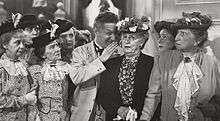
John Florence Sullivan, known professionally as Fred Allen, was an American comedian. His absurdist topically-pointed radio program The Fred Allen Show (1932–1949) made him one of the most popular and forward-looking humorists in the Golden Age of American radio.

The Jack Benny Program, starring Jack Benny, is a radio and television comedy series, which ran for more than three decades and is generally regarded as a high-water mark in 20th-century American comedy. He played one role throughout his radio and television career, a caricature of himself as a minimally talented musician and penny-pincher who was the butt of all the jokes. The show's producer, Hilliard Marks, was the brother of Benny's wife, Mary Livingstone.
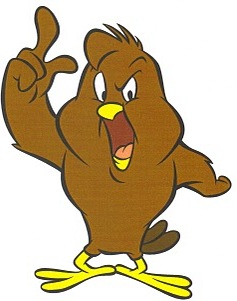
Henery Hawk is an American cartoon character who appears in twelve comedy film shorts produced in the Looney Tunes and Merrie Melodies series. His first appearance is in the 1942 theatrical release The Squawkin' Hawk, which was directed by Chuck Jones and produced by Leon Schlesinger. Henery's second screen appearance, one directed by Robert McKimson, is in Walky Talky Hawky (1946), which also features the characters Foghorn Leghorn and Barnyard Dawg in their first cartoon roles. The last Warner Brothers theatrical short to showcase the little chickenhawk is the 1961 release Strangled Eggs in which he co-stars again with Foghorn Leghorn as well as with another popular character of that period, Miss Prissy. Following that production, Henery continued to be seen periodically in other animated presentations such as The Looney Tunes Show and Looney Tunes Cartoons.
"Gwine to Run All Night, or De Camptown Races" is a minstrel song by Stephen Foster (1826–1864). It was published in February 1850 by F. D. Benteen of Baltimore, Maryland, and Benteen published a different version with guitar accompaniment in 1852 under the title "The Celebrated Ethiopian Song/Camptown Races". The song quickly entered the realm of popular Americana. Louis Moreau Gottschalk (1829–1869) quotes the melody in his virtuoso piano work Grotesque Fantasie, the Banjo, op. 15 published in 1855. In 1909, composer Charles Ives incorporated the tune and other vernacular American melodies into his orchestral Symphony No. 2.
Commander McBragg is a cartoon character who appeared in short segments produced by Total Television Productions and animated by Gamma Productions. These segments first appeared in 1963 on the animated series Tennessee Tuxedo and His Tales, then on the Underdog animated television show from 1964 to 1973, and have appeared in some syndicated prints of The Bullwinkle Show, Hoppity Hooper and Uncle Waldo's Cartoon Show.

Daffy Duck's Fantastic Island is a 1983 Looney Tunes traditionally animated compilation film directed by Friz Freleng and Phil Monroe with a compilation of classic Warner Bros. cartoon shorts and animated bridging sequences, hosted by Daffy Duck and Speedy Gonzales. This was the first Looney Tunes compilation film to center on Daffy Duck, as the previous ones had centered on Bugs Bunny.

Kenneth Howard Delmar was an American actor active in radio, films, and animation. An announcer on the pioneering radio news series The March of Time, he became a national radio sensation in 1945 as Senator Beauregard Claghorn on the running "Allen's Alley" sketch on The Fred Allen Show. The character Delmar created was a primary inspiration for the Warner Bros. cartoon character Foghorn Leghorn.

Walky Talky Hawky is a 1946 Warner Bros. Merrie Melodies theatrical short directed by Robert McKimson. The cartoon was released on August 31, 1946, and features Henery Hawk and Foghorn Leghorn. This is the first appearance of both Foghorn Leghorn and the Barnyard Dawg.

The Foghorn Leghorn is a 1948 Warner Bros. Merrie Melodies cartoon directed by Robert McKimson. The cartoon was released on October 9, 1948, and features Foghorn Leghorn, Henery Hawk and the Barnyard Dawg.
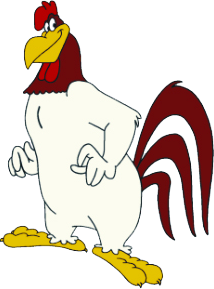
Foghorn Leghorn is a cartoon rooster who appears in Looney Tunes and Merrie Melodies cartoons and films from Warner Bros. Animation. He was created by Robert McKimson, and starred in 29 cartoons from 1946 to 1964 in the golden age of American animation. All 29 of these cartoons were directed by McKimson.
Cleghorn and Claghorn are Scottish surnames that may refer to:
Little Boy Boo is a 1954 Warner Bros. Looney Tunes animated short directed by Robert McKimson. The cartoon was released on June 5, 1954, and features Foghorn Leghorn, Miss Prissy and Egghead Jr.
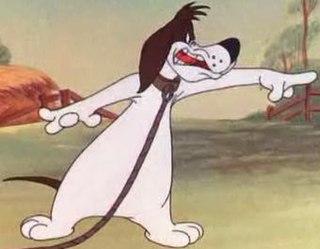
Barnyard Dawg is a Looney Tunes character. A feisty anthropomorphic basset hound, he is a friend and the archenemy of Foghorn Leghorn. He was created by Robert McKimson, who also created Foghorn, and was voiced by Mel Blanc. Dawg also feuds with other enemies as well like Henery Hawk, Daffy Duck and Sylvester. He appeared in 23 Golden Age–era Warner Bros. shorts.
The Slick Chick is a 1962 Warner Bros. Looney Tunes animated short directed by Robert McKimson. The cartoon was released on July 21, 1962, and features Foghorn Leghorn. The voices are performed by Mel Blanc and Julie Bennett.
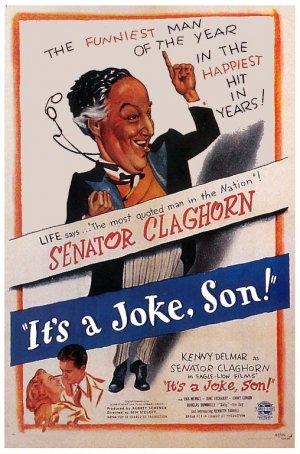
It's a Joke, Son! is a 1947 American comedy film directed by Benjamin Stoloff featuring radio comedian Kenny Delmar as Senator Beauregard Claghorn, the inspiration for the cartoon character Foghorn Leghorn. The film was the first American production for Eagle-Lion Films and although it was produced on a very small budget compared to other Hollywood films, it was a box-office disappointment; one theater chain removed the film after less than a week after it only drew $1,000 in ticket sales.
The Dixie Fryer is a 1960 Warner Bros. Looney Tunes cartoon short directed by Robert McKimson. The cartoon was released on September 24, 1960, and features Foghorn Leghorn.

Raw! Raw! Rooster! is a 1956 Warner Bros. Looney Tunes cartoon directed by Robert McKimson. The cartoon was released on August 25, 1956, and features Foghorn Leghorn. The voices were performed by Mel Blanc and an uncredited Daws Butler.
Lovelorn Leghorn is a 1951 Warner Bros. Looney Tunes cartoon directed by Robert McKimson. The cartoon was released on September 8, 1951, and features Foghorn Leghorn, Miss Prissy and the Barnyard Dawg.
The Fred Allen Show is a long-running American radio comedy program starring comedian Fred Allen and his wife Portland Hoffa. Over the course of the program's 17-year run, it was sponsored by Linit Bath Soaps, Hellmann's, Ipana, Sal Hepatica, Texaco and Tenderleaf Tea. The program ended in 1949 under the sponsorship of the Ford Motor Company.

Charles Cantor was an American radio and TV actor. Cantor was known for his frequent appearances on radio, sometimes, totaling 40 shows a week, during the 1930s, 1940s and 1950s. Cantor also appeared in nearly 30 television shows between 1951 and 1965.
